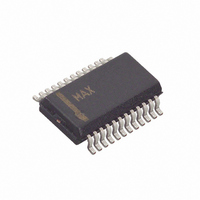MAX7324AEG+ Maxim Integrated Products, MAX7324AEG+ Datasheet - Page 10

MAX7324AEG+
Manufacturer Part Number
MAX7324AEG+
Description
IC I/O EXPANDER I2C 8B 24QSOP
Manufacturer
Maxim Integrated Products
Datasheet
1.MAX7324AEG.pdf
(20 pages)
Specifications of MAX7324AEG+
Interface
I²C
Number Of I /o
8
Interrupt Output
Yes
Frequency - Clock
400kHz
Voltage - Supply
1.71 V ~ 5.5 V
Operating Temperature
-40°C ~ 125°C
Mounting Type
Surface Mount
Package / Case
24-QSOP
Includes
POR
Operating Supply Voltage
1.71 V to 5.5 V
Power Dissipation
761.9 mW
Operating Temperature Range
- 40 C to + 125 C
Input Voltage
1.65 V to 1.197 V
Maximum Clock Frequency
400 KHz
Mounting Style
SMD/SMT
Output Voltage
0.3 V
Lead Free Status / RoHS Status
Lead free / RoHS Compliant
I
and Eight Inputs
The MAX7324 operates as a slave that sends and
receives data through an I
uses a serial-data line (SDA) and a serial-clock line (SCL)
to achieve bidirectional communication between mas-
ter(s) and slave(s). The master initiates all data transfers
to and from the MAX7324 and generates the SCL clock
that synchronizes the data transfer (Figure 1).
SDA operates as both an input and an open-drain out-
put. A pullup resistor, typically 4.7kΩ, is required on
SDA. SCL operates only as an input. A pullup resistor,
typically 4.7kΩ, is required on SCL if there are multiple
masters on the 2-wire interface, or if the master in a sin-
gle-master system has an open-drain SCL output.
Figure 1. 2-Wire Serial-Interface Timing Details
Figure 2. START and STOP Conditions
10
2
SDA
SCL
CONDITION
C Port Expander with Eight Push-Pull Outputs
______________________________________________________________________________________
START
SDA
SCL
S
t
HD,STA
START CONDITION
t
LOW
2
t
R
C interface. The interface
t
SU,DAT
t
HIGH
Serial Interface
t
Serial Addressing
F
t
HD,DAT
CONDITION
STOP
P
t
REPEATED START CONDITION
SU,STA
Each transmission consists of a START condition sent
by a master, followed by the MAX7324’s 7-bit slave
address plus R/W bit, 1 or more data bytes, and finally
a STOP condition (Figure 2).
Both SCL and SDA remain high when the interface is
not busy. A master signals the beginning of a transmis-
sion with a START (S) condition by transitioning SDA
from high to low while SCL is high. When the master
has finished communicating with the slave, the master
issues a STOP (P) condition by transitioning SDA from
low to high while SCL is high. The bus is then free for
another transmission (Figure 2).
One data bit is transferred during each clock pulse.
The data on SDA must remain stable while SCL is high
(Figure 3).
Figure 3. Bit Transfer
SDA
SCL
t
HD,STA
DATA LINE STABLE;
DATA VALID
CHANGE OF DATA
ALLOWED
START and STOP Conditions
t
SU,STO
CONDITION
STOP
t
BUF
CONDITION
Bit Transfer
START











